Day 1 – 25th March, 2019
Inauguration and sharing workshop objectives
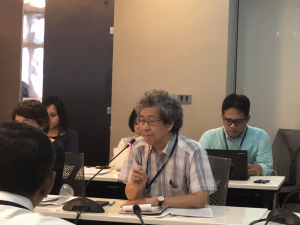
Professor Soraj Hongladarom
Session 1 started with an inaugural address by Professor Soraj Hongladarom of Chulalongkorn University. Professor Hongladarom spoke about digital issues in Thailand, and how they find resonance with issues worldwide.
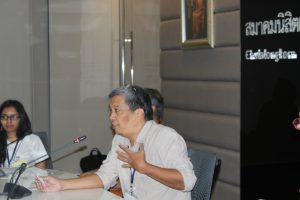
Edgardo Legaspi
Edgardo Legaspi from Focus On The Global South then welcomed all participants on behalf of the organizers, and spoke about the changing nature of geopolitics in the digital world, with digital power substantively deciding political power.
Deborah James from Our World Is Not For Sale explained the objectives of the workshop: to build a global coalition of progressive actors in both the digital sector and in other sectors or thematic areas affected by the digital.
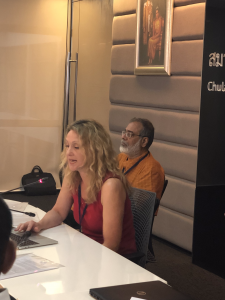
Deborah James
She talked about how those working on free trade agreements and the WTO are now having to work on digital issues, and how every sector and area is being changed by the digital – including health, agriculture, and labor. What is needed to counter this predominance of digital power is an anti-corporate, pro-people, pro-South vision, and a plan to build the world of economic justice and equity that we want. We can only take on Big Tech with the full participation of people from everywhere. We must also think of those who are not in the room – gig workers, consumers, citizens whose democratic rights are being hacked away.
As long as corporations see the possibility to bend the rules, they will do so. Which is why, now is the time for us to come up with an actionable, common, global digital justice agenda.
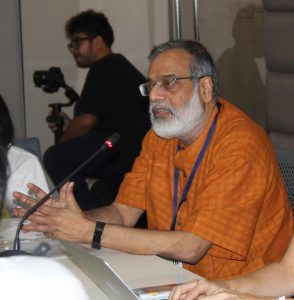
Prabir Purkayastha
A presentation titled Digital Monopolies, Surveillance Capitalism and Challenges for Democracy was then made by Prabir Purkayastha from Just Net Coalition. It explained how the world’s largest companies by market capitalization are now digital companies, and how the importance of intangible assets has risen through time.
Prabir also talked about how digital technology had enabled the fastest rise of monopolies in the world, and how the internet had been ‘enclosed’. For example, more than 70% of web traffic today goes to Google and Facebook. The sharp rise in Google and Facebook advertising revenues has coincided with a fall in advertising revenues for newspapers, both print and digital.
Social relations are being mined as data that is being used to create machine learning algorithms. The presentation raised questions about how we can fight for the commons and public spaces in this age.
You can find the presentation here.
What is the digital problem?

Nanjira Sambuli
Session 2 was facilitated by Nanjira Sambuli from the World Wide Web Foundation and Renata Avila from Fundacion Cuidadano Inteligente. They asked participants to introduce themselves and answer the questions: What is the most important digital question? What digital issue would you not like to talk about?
Some digital questions and issues highlighted by participants as the most important ones were:
1. How we can confront global digital corporations by bringing about greater consciousness among organized civil society.
2. Understanding how automation intersects with political economy.
3. Ownership of digital intelligence about us.
4. How programers and other technology workers can become movement leaders for equity and social justice.
5. The programming of humans through digital infrastructure.
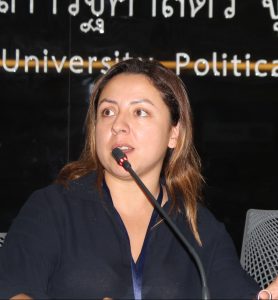
Renata Avila
6. Digital profiling of people, and the platformization of industries.
7. The use of trade deals to force people and countries to sign away their rights and the new scramble for the Global South.
The topics participants said they would rather avoid were those of:
1. An undue focus just on bias and transparency in AI (because it obscures political economy).
2. The limiting framing of “digital rights”, and of only cultural subversion as resistance (because this strategy accepts the current system as a given and leaves the fundamentals unchanged).
3. Representation in the digital world (because we should be aiming for emancipation instead).
4. Overly technical discussions, like about blockchain (because the larger questions were about the social sphere mediated by digital technology).
Responding to the digital problem

Chat Garcia Ramilo & Richard Hill
Session 3 was facilitated by Chat Garcia Ramilo from Association for Progressive Communications and Richard Hill from Association for Proper Internet Governance. Participants first answered the question, “What is being done about the digital problem?”
The key threads that emerged from the answers to these questions are:
1. The Global South is constantly responding to challenges and frameworks set by the Global North, and is not setting the agenda. Governments’ hands are being tied through trade agreements.
2. Inclusion in the digital world, particularly of women, often ignores structural issues. Do we want a share of a poisoned pie? At the same time, one cannot afford to be excluded.
3. Proposals like universal basic income are also analogous to current structures and are class preserving. How do we address the root cause of repeating patterns of exploitation?
4. We engage with international fora on internet and digital governance, but these are mostly ineffective and have been co-opted. The tech giants dominate international governance meetings about data and other digital issues.
5. Countries, especially in Africa, are being told that connecting to the grid is of foremost importance, and that structural considerations can wait.
To the question, “What needs to be done about the digital problem?”, participants answered:
1. We must develop better and clearer ties between social justice, human rights, environmental sustainability,and tech movements. .
2. We, as progressives, must self-critically analyze the language we use to talk about technology. Issues of technology and digital justice, especially around trade, need to be made more accessible to people. In particular, we need to de-mystify e-commerce.
3. Demands for regulation of the digital economy should be assessed carefully so that, as against their likely intent, they do not end up benefiting the largest global digital corporations.
4. We need to inter alia position competition law and the right to unionize as counter-strategies to rapidly developing ‘enclosures’ of the digital world.
5. We need to demand both temporary concessions, such as through resisting global digital trade agreements, and radical solutions, such as developing public digital infrastructure to rival the likes of Google and Facebook.
6. We need more sectoral research on how digital trade agreements will affect each sector like agriculture, education, health, etc.
7. We need to be actively building and promoting alternatives, for example, by working with Uber drivers to create a platform where data is owned by them. We also need to build capacity and support the development of the digital industrial policies in countries.
8. We need to bring back the battles about intellectual property and copyright firmly into the digital era. Education is inextricably linked to copyright policy.
A representational matrix of the answers to these two questions is here.
Capturing digital power for the people
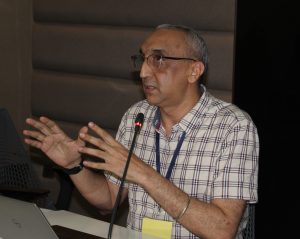
Parminder Jeet Singh
Session 4 began with a presentation by Parminder Jeet Singh from IT for Change. The presentation argued that traditional concepts and instruments may be inadequate to fight the changing nature of capitalism, and that progressives are still using these instruments. Digital power began with software power in the 1990s, and the advent of the internet that consolidated this power. Ironically, the internet was seen as a counter-power when it first emerged. New digital power comprises data power, software power and network power, and the platform is the key economic institution that entrenches this power.
Digital power means owning intelligence about people. There is a qualitative difference between mechanization and intelligencification of the economy in this manner, where the top corporations now own the “brains” of different sectors. Those who own digital intelligence have power over those who do not, even if the latter avail of services that use this intelligence.
The presentation spoke of the inadequacy of responses tried so far, including liberal individualistic responses like the openness framework, individual data control (including data management services), market-based regulation, and those based on ethics divorced from power concerns. Some responses have focused solely on the machine and not the human interests behind the machine.
We first need to delineate the areas which we do not want to datafy and digitalize at all. Then, we need to identify areas open to digitalization, but where this digitalization needs to be slowed down and managed better, in order to not upturn livelihoods. Third, in some areas, we need to take control of digitalization as it happens.
Then, a new progressive framework of communitizing digital resources was presented, with a two-pronged focus on both democratic control and economic appropriation. This would entail community software, community networks, community data, and community AI.
The presentation can be found here.
Discussions after the presentation were around the following points:
1. In the context of AI, there are people behind the machine, and people who pay those people. Strategies for dealing with both sets will be different. The former need to be unionized.
2. Digital power as a category needs to be refined. The existence of property and class need to be considered. The state is the only instrument available for redistribution, and its class character matters.
3. Localism can be a solution to many digital issues, but some of our problems can only be resolved transnationally.
4. There are inequalities and power dynamics within communities, and the idea of communitizing data needs to grapple with these. The framing of the digital commonwealth captures similar ideas.
5. Even if digital resources are in principle communitized, appropriate principles, frameworks and means of their governance are required.
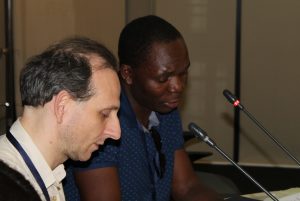
Ansgar Koene & Arthur Gwagwa
In Part 2 of Session 4, Ansgar Koene from the University of Nottinghamshire and Arthur Gwagwa from Global South Initiative facilitated an open discussion on formulating key ideas and points of departure for a progressive and Southern analysis of the ‘digital’, and frameworks of advocacy and action. Participants were divided into groups, and each group reported back on its discussions.
Group discussions included the following themes and insights:
1. Any progressive digital justice analysis must aim at shifting power to the people. We have to be clear that what we are against is digital monopolies, and not the internet or digital technology themselves.
2. Data can perhaps be thought of as a public good. Anything that doesn’t put ownership of data and the digital space at the center will potentially not be adequate.
3. Key principles to keep in mind are decentralization, enabling collective action, accountability, and transparency. We first need to look at and fully understand the existing data and phenomena, and then arrive at principles – taking pointers from climate change action.
4. We need to develop non-financial metrics to measure the digital outcomes we want to measure. Also, efficiency alone cannot be the reference point.
5. We can employ different ways to think about localism and communities. There is a localism of shared purpose, such as farmers’ communities. There are multiple levels of communities that can control technology, depending on the purpose of action. Similarly, we can explore the idea of data rights specific to different sectors; for example, to have completely non-negotiable parameters on the sharing of children’s data.
6. There was a recognition that local community-based governance can be regressive and repressive. We must analyze classes within communities. How will smaller communities talk to each other? Can they find common ground for collective action?
7. Technical solutions must be used as well. Data can be held in a way that it doesn’t have to be globally shared but it can still provide global insights.
8. The problems with the state must also be kept in mind. We can explore the notion of trusteeship, where data is held neither by corporations nor by the government. The trust can be run in line with the specific purposes of data use.
9. An important question in progressive strategy is the role of international rules. Do we look at individual states for ensuring digital justice? Can we tax social media? We must seek tax justice. Global digital corporations avoid and evade taxes using tax havens and tax optimization techniques.
10. We must think of MSMEs as potential beneficiaries of progressive policies. We can build a framework for empowerment of the informal sector and small players.
11. Progressive actors need to improve communication and simplify issues.
12. We have to examine if and how data is a form of labor. Data unions could be a way to conceptualize how people can come together to defend their data rights.
13. We can no longer organize using the same vocabulary we have been using. New, powerful, data related progressive language is needed. At the same time, the amorphous category of “power” is not helpful – the profit motive still reigns supreme.
14. Different models may be needed for fixing the distinct (but related) problems of automation leading to unemployment, and data extractivism leading to knowledge-based control. The capital-labor relationships work differently in the two cases.
